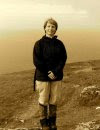
Today we talked about how the medieval mindset conferred a lot of animistic power on nature, and the Green Man (Herne, Cuernunnos, Pan, whoever) had great power in the Forest domain. I neglected to mention in class, that our "English" word "Forest" does not come from the latin for woods (silva) but from "Forestis" meaning "outside", also where we get the word "foreign" and "foreigner". Thus, the forest was the mysterious and unknown "outside", the beyond, "lo mas alla" of magical realism. Interestingly enough, "wood" is an Old High German word "wudu" that just means tree, what a tree is made of, and a bunch of trees all together. No symbolic judgement for them. A fairly old and generic term. The Forest was where the grail knights had to go and enter only where there was no path so they could be tested for the purity of heart required by the quest. Robin Hood has alternately been identified as the trickster forest god, Herne of the Wild Hunt, a guy from Huntington, or a guy from Locklsey who really did beat people up in the woods. But, like Arthur before him, he has become a conglomeration of what we need to help us make sense of our world when we tell stories about him.

In class, we read the Howard Pyle version of the medieval songs. There were very medieval parts of the stories, but Pyle has offered them through a romantic lense. We get the medieval forest trickster god who makes a mockery of the powers of Town. We get the romantic hero who uses his individual sense of personal justice to guide his actions in giving succor to those in need and avenging injustice against the wronged. We get the medieval timeless trackless forest where social rules are lifted, and the romantic notion that every individual is free and equal to express hs talent. There are also some oddly homophobic parts like where Robin and Little John criticize Will Scarlett for his clothing, but then they shut up when he rips a tree out by the roots and kicks Robin's butt. In general I love the Howard Pyle version, and I enjoy the humor he injects, but the mysogynistic ending where the Prioress of Kirklees bleeds Robing to death because she is afraid of losing her position really irritates me. Howard, we didn't need that. You should have stuck to the trickster forest god. It's kind of like the American remake of Godzilla where they actually kill the monster. Hey, you don't kill forces of nature: they just continue on. Robin shouldn't be killed off: he should keep living happily in the Greenwood for as long as we need him.



4 comments:
Goddammit, I want to come take this class. But with no assignments and more beer, ok?
The spelling of "wudu" sent me searching. Old High German (AHD) also used "forestis" and "boscus" to define the forest as a whole in addition to "witu." REALLY old AHD usually used two of the letter "u" to get the modern English "w" sound (a sound that never made it into modern German), so I thought it should be "uudu" or "uuidu/uuiutu" (depending on where in Germany you may have been). But my quick search didn't turn up any "uu" beginnings.
Then, I remembered the Merseburger Zaubersprüche, one of the earliest German writings (pre Christian, before 750 and recorded in the 10th century). One of these incantations/spells/charms, includes yet another "woods" reference meant to cure a horse's wrenched ankle:
Phol ende uuodan
uuorun zi holza...
(Phol and Wodan
rode to the woods...)
Interestingly, Freya is one of the three women come to Wodan's aid to cure the horse.
"Holza" is directly related to the modern German "Holz" meaning wood but including a forest of trees.
So what does all this show--just how much everyone moved around sharing language. I also love the fact that none of this would be preserved if it were not for Christian monks, who in their free time recorded these common words in the free spaces of sacred manuscripts.
Wow, Frau Page: you win the Geek Out award for the day! I love it. The Geek in me salutes the Geek in you. What a great scabble word: uuiutu.
If the word for forest and foreign both refer to the outside, then safety was on the inside. So the situation of inside and outside has switched from ancient times. It is as if the psychological elements of the human being only began to exist after the wolves and bears and panthers were eradicated and after the devil dissappeared from "view". Today in the 21st century our interior selves are so scary that art has only to refer to it. Movies conjure up the worst while you just sit.
Post a Comment